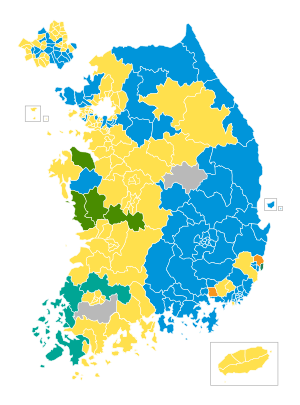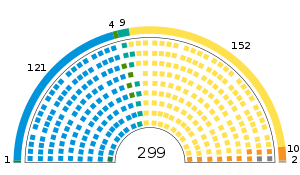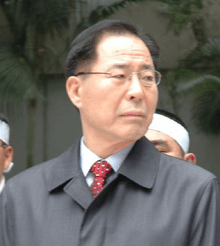2004 South Korean legislative election
Legislative elections were held in the Republic of Korea (South Korea) on April 15, 2004. In the 17th election for the National Assembly, voters elected 299 members of the legislature. The newly formed Uri Party and other parties supporting President Roh Moo-hyun, who was impeached by the outgoing National Assembly, won a majority of seats. This was the first time a centre-left liberal party won a majority in the National Assembly.
| |||||||||||||||||||||||||||||||||||||||||
All 299 seats in the National Assembly 150 seats needed for a majority | |||||||||||||||||||||||||||||||||||||||||
|---|---|---|---|---|---|---|---|---|---|---|---|---|---|---|---|---|---|---|---|---|---|---|---|---|---|---|---|---|---|---|---|---|---|---|---|---|---|---|---|---|---|
| Turnout | 60.6% ( | ||||||||||||||||||||||||||||||||||||||||
| |||||||||||||||||||||||||||||||||||||||||
 | |||||||||||||||||||||||||||||||||||||||||
 ■ Uri Party ■ GNP ■ DLP ■ ULD ■ MDP ■ National 21 ■ Others | |||||||||||||||||||||||||||||||||||||||||
 |
|---|
| This article is part of a series on the politics and government of the Republic of Korea |
|
|
|
|
Parties
The newly formed Uri Party (Uri-dang or Our Party) gained support through its opposition to the impeachment of President Roh. It won 32 out of 49 seats in Seoul, 44 out of 62 in Incheon and Gyeonggi, confirming that a majority of voters supported the President Roh.
The conservative Grand National Party, which supported the impeachment of President Roh, suffered a loss of support, but won a majority in North Gyeongsang and South Gyeongsang regions and retained the 100 seats necessary to block constitutional changes.
The Democrat Labour Party won only 10 seats, but this was considered a great triumph considering that South Koreans are traditionally anti-communist and against left-wing policies.
The Millennium Democratic Party, formerly the major liberal party, was the second-largest party prior to the election but sustained the biggest loss in the backlash following its leading role in the impeachment of Roh, as much of its support shifted to the Uri Party.
The United Liberal Democrats, a regional party based on North Chungcheong and South Chungcheong regions, has lost support since its leader, Kim Jong-pil, did not contest the last presidential election.
Results
| Party | Proportional | Constituency | Total seats |
+/– | |||||
|---|---|---|---|---|---|---|---|---|---|
| Votes | % | Seats | Votes | % | Seats | ||||
| Uri Party | 8,145,824 | 38.3 | 23 | 8,957,665 | 41.99 | 129 | 152 | New | |
| Grand National Party | 7,613,660 | 35.8 | 21 | 8,083,609 | 37.90 | 100 | 121 | –12 | |
| Democratic Labour Party | 2,774,061 | 13.0 | 8 | 920,229 | 4.31 | 2 | 10 | +10 | |
| Millennium Democratic Party | 1,510,178 | 7.1 | 4 | 1,698,368 | 7.96 | 5 | 9 | −106 | |
| United Liberal Democrats | 600,462 | 2.8 | 0 | 569,083 | 2.67 | 4 | 4 | −13 | |
| Christian Party | 228,837 | 1.08 | 0 | 8,267 | 0.04 | 0 | 0 | New | |
| National Integration 21 | 119,746 | 0.60 | 0 | 63,989 | 0.30 | 1 | 1 | New | |
| Green Social Democrats | 103,845 | 0.49 | 0 | 37,789 | 0.18 | 0 | 0 | New | |
| Socialist Party | 47,311 | 0.22 | 0 | 8,004 | 0.04 | 0 | 0 | 0 | |
| Democratic Unity | 39,785 | 0.19 | 0 | – | – | – | 0 | New | |
| Labor Party | 37,084 | 0.17 | 0 | 2,582 | 0.01 | 0 | 0 | New | |
| Hope2080 | 31,501 | 0.15 | 0 | 1,253 | 0.01 | 0 | 0 | New | |
| Democratic Republican Party | 24,360 | 0.11 | 0 | 2,405 | 0.01 | 0 | 0 | 0 | |
| Confederation of Nations | 9,330 | 0.04 | 0 | 226 | 0.00 | 0 | 0 | New | |
| Democratic People's Party | – | – | – | 4,347 | 0.02 | 0 | 0 | –2 | |
| Independents | – | – | – | 972,954 | 4.56 | 2 | 2 | –3 | |
| Invalid/blank votes | 294,960 | – | – | 250,174 | – | – | – | – | |
| Total | 21,580,944 | 100 | 56 | 21,580,944 | 100 | 243 | 299 | +26 | |
| Registered voters/turnout | 35,596,497 | 60.63 | – | 35,596,497 | 60.63 | – | – | – | |
| Source: IPU | |||||||||
By region
| Region | Uri Party | GNP | DLP | MDP | ULD | Others | Total |
|---|---|---|---|---|---|---|---|
| Seoul | 32 | 16 | – | – | – | – | 48 |
| Busan | 1 | 17 | – | – | – | – | 18 |
| Incheon | 9 | 3 | – | – | – | – | 12 |
| Daegu | – | 12 | – | – | – | – | 12 |
| Gwangju | 7 | – | – | – | – | – | 7 |
| Daejeon | 6 | – | – | – | – | – | 6 |
| Ulsan | 1 | 3 | 1 | – | – | 1 | 6 |
| Gangwon-do | 2 | 6 | – | – | – | – | 8 |
| Gyeonggi-do | 35 | 14 | – | – | – | – | 49 |
| South Gyeongsang | 2 | 14 | 1 | – | – | – | 17 |
| North Gyeongsang | – | 19 | – | – | – | 1 | 20 |
| South Jeolla | 7 | – | – | 5 | – | 1 | 13 |
| North Jeolla | 11 | – | – | – | – | – | 11 |
| South Chungcheong | 5 | 1 | – | – | 4 | – | 10 |
| North Chungcheong | 8 | – | – | – | – | – | 8 |
| Jeju | 3 | – | – | – | – | – | 3 |
| Proportional representation | 23 | 21 | 8 | 4 | – | – | 56 |
| Total | 152 | 121 | 10 | 9 | 4 | 3 | 299 |
.jpg)

